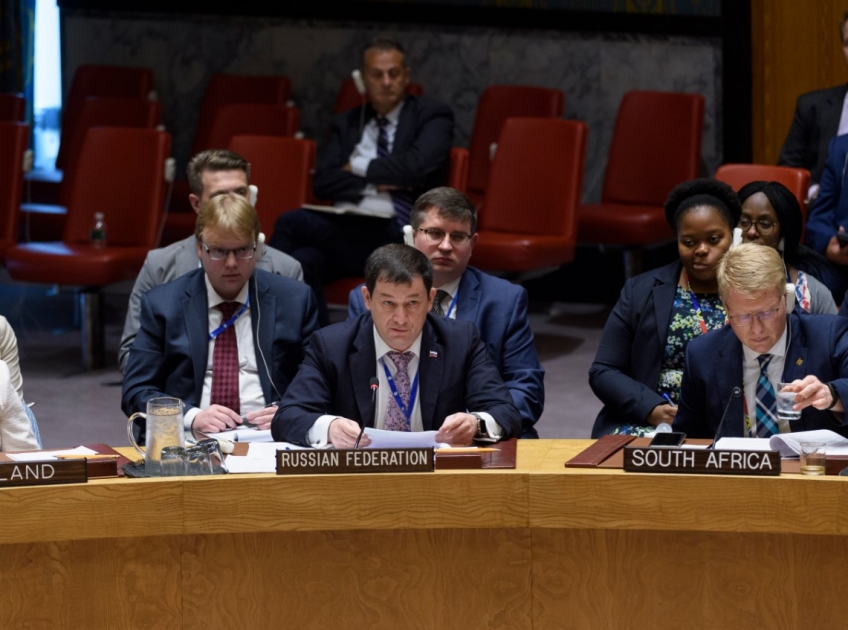Statement by First Deputy Permanent Representative Dmitry Polyanskiy at the UN Security Council Meeting on the Sudan and South Sudan
Mr. President,
We are thankful to Under-Secretary-General J-P.Lacroix for the information on the state of affairs in Darfur, and for presenting main results of the strategic report of the UN and AU Joint Task Force. We have listened with great attention to the report by Assistant Secretary-General Andrew Gilmour on the situation with human rights in the region.
We share the considerations contained in the strategic report by the UN Secretariat and the Commission of the African Union that say there is a clear improvement of the situation in the area of security. Sporadic clashes with “Sudanese Liberation Army” under Abdul Wahid al Nur in Jebel Marra do not change this assessment. We also point out some normalization in the humanitarian area. The general dynamics in the regions from where the Blue Helmets have already withdrawn has not sustained any changes.
Mr. President,
We believe all of this proves that the Security Council has made a right decision to cut the UNAMID military component with prospects to fully close the mission by the end of 2020.
Distinguished representatives of Great Britain, Germany have proposed a technical extension of the UNAMID. They even referred to the communique by the African Union, however, they cited only selected fragments thereof.
I would like to elaborate that in para. 10 the Peace and Security Council approved of the strategic report and of further drawdown of the Mission. I see no reason why we should act otherwise. I call upon the colleagues to abide by the letter and spirit of Security Council resolution 2429 and to discuss modalities of peacekeepers’ withdrawal.
Besides, the experts have just started discussions of your proposal regarding a technical extension. We have not engaged in favor of it. Why do you raise this in an open format and actually pre-empt our experts? This runs counter to the Security Council common practice. It does not do you any credit, but gravely complicates our work. This step has signs of megaphone diplomacy, which we thought we all decided to abandon.
We would like to draw your attention to the following aspect: the UN relentlessly speaks about its precarious financial situation. The Secretary-General openly raises alarm and calls to overcome these predicaments collectively. Debt to the budget of peacekeeping operations is steadily growing. However, what do we see? Some of our colleagues insist that we should put on hold the closure of the operation that costs over half a billion USD. Just to compare – the mission in Kosovo that many of our Western partners are eager to close despite the tension that remains there, costs less than 40 million USD. Where is the economy then?
Mr.President,
By all means, we are realistic. We understand that Darfur faces multiple complicated challenges. There are issues and problems to be solved. However, all of this are peacebuilding rather than peacekeeping tasks. Hybrid operation deployed 12 years ago by the UN and the AU helped overcome the acute phase of the crisis. The analysis of its activity will be vital for prospective peacekeeping operations. Now it is time we concentrated on restoration and economic development of the region – this should be the priority for the international community.
We are surprised to note that some of our colleagues at this table use the agenda of this meeting in order to share their assessments of the domestic political situation in the country rather than to discuss modalities of mission’s closure. Meanwhile, the Security Council statement for the press that was endorsed a few days ago and the African Union communique contain a clear call to abstain from any external interference. It seems our Western colleagues decided to ignore these provisions.
Let me underscore: settlement of the domestic crisis in the country is the prerogative of the Sudanese. External pressure, ultimatums, distinct support of one of the sides during negotiations and, all the more, straightforward interference in the internal affairs of a sovereign State are absolutely unacceptable. All of it can only aggravate the existing contradictions.
We commend the positive dynamics on the ground that resulted from the Ethiopian mediator initiative. We should support African efforts rather than dictate what and how the Sudanese, who are in a complicated situation, should do. We assure, they will agree much quicker if there is no lecturing coming from the outside.
In conclusion, I have two questions for Under-Secretary-General J-P.Lacroix. Apart from decree of the Transitional Military Council #102 are there any other technical issues that impede the closure of the UNAMID? As estimated by the Secretariat, what time period is required to drawdown and subsequently close the UNAMID?
I would appreciate the responses.
Thank you.
